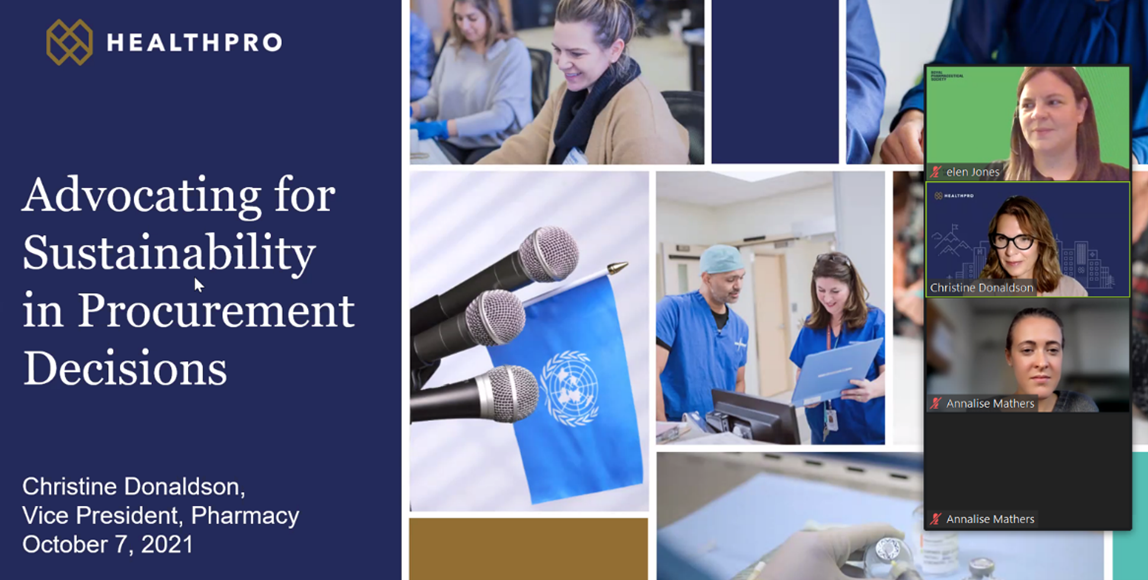HealthPRO Canada News
November 22, 2021
Fostering Sustainability in Pharmacy: The time for action is now

At the beginning of October, The University of Toronto’s Centre for Practice Excellence Speaker Series hosted a discussion on Fostering Environmental Sustainability in Pharmacy. Clockwise from top left: Claire Anderson, Royal Pharmaceutical Society; Fiona Miller, Director, Centre for Sustainable Health Systems; Ellen Jones, Director, Royal Pharmaceutical Society; Annalise Mathers, Medication Management Research Officer, University of Toronto; and HealthPRO’s Christine Donaldson, Vice President, Pharmacy.
______________________________________________________________________
The need for sustainable business practices, across all sectors, has never been more prevalent – but when it comes to sustainability in the healthcare industry, the time for action to reduce the effects of pharmaceuticals on our environment is now.
To put the situation surrounding the climate harms of healthcare into perspective on a national level, consider the fact that the Canadian healthcare sector’s environmental impact is estimated at 4.6 per cent of Canada’s total 2020 greenhouse gas emissions.
Due to the large carbon footprint that pharmaceuticals produce, fostering sustainable pharmacy practices will play a major role in how healthcare systems across the globe manage their impact on the global climate situation.
The future of pharmacy
“The future for pharmacy is to become more sustainable, there is more we can do collaboratively,” said Fiona Miller, Director, Centre for Sustainable Health Systems. “There is tremendous opportunity and even obligation to make sustainability a visible part of our enterprise. With that, also comes the opportunity for innovation. Technological innovation, which is very important for the pharmaceutical sector in terms of green chemistry and other similar issues. As well as regulatory innovation, in terms of imposing the kinds of structures, and creating conditions that will drive markets in new directions. And lastly, innovating practices, to drive change in the ways in which systems and professional services are designed.”
At their core, sustainable pharmacy practices safeguard the health and wellness of the world’s population. Which is why in countries such as the United Kingdom (UK), environmental sustainability is now at the forefront of health systems’ policies and procedures.
In the UK, medicines account for 25 per cent of all carbon emissions. However, much of the leading global data on decarbonization is also coming out of the UK, starting with the Royal Pharmaceutical Society’s (RPS) Declaration of a Climate and Ecological Emergency in September of 2021. The declaration prompted the National Health Service (NHS) to work toward a goal of net-zero emissions by 2045.
“Initially, we weren’t sure how all-encompassing our policy should be, but we have been speaking to experts in the field and even the basic things we can be doing as a profession make a difference,” said Ellen Jones, Director, Royal Pharmaceutical Society. “One of the difficulties with the process is that there is so much scope. Prioritizing the areas where pharmacy can have the greatest impact on sustainable practices can sometimes be difficult. However, we can have an impact of every stage of a medication’s journey from development through to delivery to the patient’s bedside. So, we really are trying to look at the entire spectrum of what we can be doing better.”
As Ellen went on to highlight, the need for a collaborative approach to establishing sustainable environmental practices has never been more pressing. Climate change is the biggest health threat the world has even witnessed, so equally focused initiatives are needed as an appropriate response to mitigate present and future impact.
Establishing sustainable procurement practices
Advocacy, a critical component in the fight against the environmental impacts of climate change, was at the core of the final stages of the discussion. One in which HealthPRO’s Vice President of Pharmacy, Christine Donaldson, highlighted advocating for sustainable procurement decisions in the healthcare sector.
“We started including sustainable procurement questions in our contracting process as we knew the Canadian federal government had pledged its public support to achieving the 2030 agenda for the United Nations,” Christine told the panel. “We’re now asking suppliers if they are compliant to that agenda, and to provide us with their codes of conducts to see how they manage their providers within the supply chain.”
“However, an issue with nitrile gloves made in Malaysia led us to look closely at what else we could be doing to ensure that the contracted products that our hospitals and members were using were not made in unsustainable conditions.”
Christine continued the discussion by focusing on the barriers and enablers to establishing sustainable procurement practices. While highlighting some important obstacles to overcome, such as the need for more legislative guidance and financial support, Christine was also quick to point out the steps that can be taken immediately to help promote sustainable procurement.
“You can begin that education journey into knowing the total value of what you’re purchasing, and by having more confident and well-qualified procurement staff trained in sustainability to make important calculations such as lifecycle costing,” explained Christine. “It might cost a bit more upfront, but through the lifecycle you do benefit in the long term. We’re connecting with other countries who use eco-labels and other important standards that will drive some of our decision making.”
What’s next for sustainable procurement?
At the close of her presentation, Christine looked at the current opportunity facing HealthPRO in not only educating but also helping to prepare future generations for the products being introduced into Canadian healthcare facilities.
“This is a very important topic, with a growing global community as a part of it,” Christine said. “Hopefully we continue to work together, exchange best practices, and promote a national award system in the future.”
The ongoing work HealthPRO is already committed to, such as regularly seeking supplier engagement and feedback, adding sustainability questions for suppliers in our Anesthetic Gases RFP, and the launch of our Sustainability Scorecard next year, can make a major impact on the Canadian sustainable procurement landscape.
As noted throughout the discussion, the need for a collaborative approach in mitigating the environmental impact of healthcare and pharmacy has never been greater.


